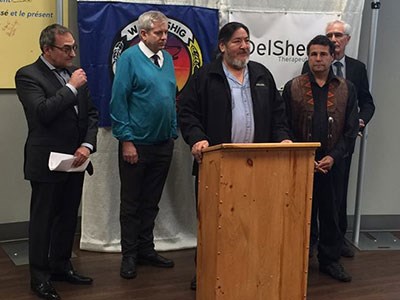A former federal government-run forestry nursery in Swastika will soon be the home of a medicinal marijuana production facility, which represents a unique collaboration between industry and the Wahgoshig First Nation.
DelShen Therapeutics is currently undertaking a multi-million-dollar retrofit of the 40-000-square-foot former nursery, located just outside of Kirkland Lake. DelShen, which is aspiring to become one of the industry’s leading producers of pharmaceutical-grade medicinal marijuana, is still awaiting approval of its operating licence from Health Canada before it can proceed.
There are currently 14 licensed medicinal marijuana production facilities in Ontario, and a total of 26 across Canada.
Unique to the Swastika project is Wahgoshig First Nation’s $2-million investment in the company, which takes the form of a convertible debenture.
“We’re excited to be part of a unique agreement that has the potential to deliver a broad range of economic and social benefits for the Wahgoshig First Nation and other Aboriginal people in the region,” Wahgoshig Chief David Babin said in a news release.
“This investment exceeds all of our long-term sustainable economic development criteria, and we believe Wahgoshig’s investment in DelShen’s success will benefit the entire region.”
Highlights of the agreement include the establishment of a training program to “increase the capacity for employment among Aboriginal people”; seed capital from DelShen for a community drug and alcohol prevention and rehabilitation program; and Wahgoshig representation (one seat) on DelShen’s board of directors.
DelShen plans to invest $18 million over three phases of the project, and it predicts creating between 30 and 100 jobs over the course of development.
Martin Cauchon, chair of DelShen’s board of directors, said in an interview the company started speaking with the First Nation two years ago about its plans, which culminated in the current partnership.
DelShen considered a number of communities before making its decision, but ultimately chose the Kirkland Lake area because it wanted to establish in a region where it could run a successful business while making a difference to the community around it.
“We came to quite a unique agreement, which is a community benefit agreement,” said Cauchon of the Wahgoshig collaboration. “The announcement is basically about partnership, support to the various communities, and it’s about working together.”
Cauchon said a feature of the partnership is the training program, which will not only benefit the First Nation by providing jobs for its citizens, but also supply DelShen with a skilled workforce for its facility, which can often be a challenge for any new business.
“It’s true anywhere in Ontario, it’s true across Canada, and it’s true around the world,” he said. “So, with the agreement we have with the First Nation, we will have access to a pool of very good manpower, people that will be very well trained, and at the same time we will establish an official program to make that happen.”
The $2-million convertible debenture essentially acts like a loan, Cauchon said, which in a few particular cases, can trigger a conversion into shares of the company for Wahgoshig.
Cauchon, a former member of parliament in Jean Chrétien’s cabinet, was in the early 2000s the first cabinet member to introduce legislation to decriminalize marijuana.
Though he emphasized the production of marijuana for medicinal purposes and the decriminalization of marijuana for recreational use are separate issues, he said he does believe the Canadian public is more accepting now of the idea of decriminalization than it was when he first broached the topic 15 years ago.
“I do believe the piece of legislation we have in place is very difficult to enforce, so if you can’t enforce the legislation properly, you have to change it, which is exactly what I wanted to do 15 years ago,” he said.
Martin Shefsky, DelShen’s founder and executive director, is also chair of the board at Northern Gold Mining.
Northern Gold is currently conducting exploration activity at its Golden Bear property east of Timmins.
The junior miner started consultation with Wahgoshig when it first started working on its Golden Bear property in 2010 and signed an exploration agreement with the community in 2012.




